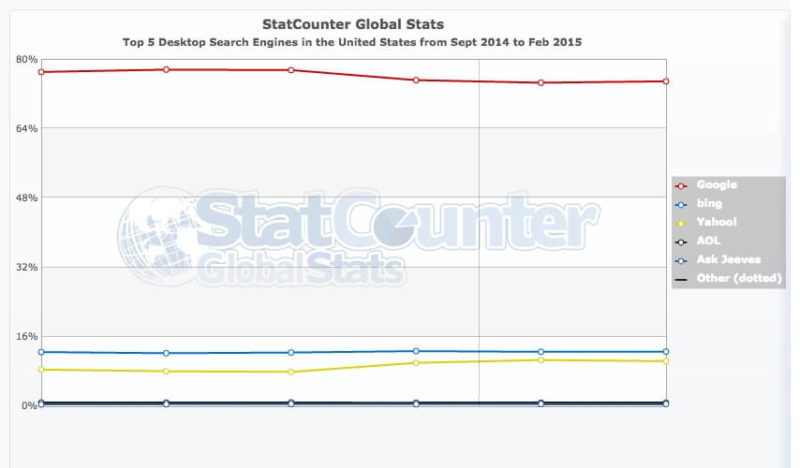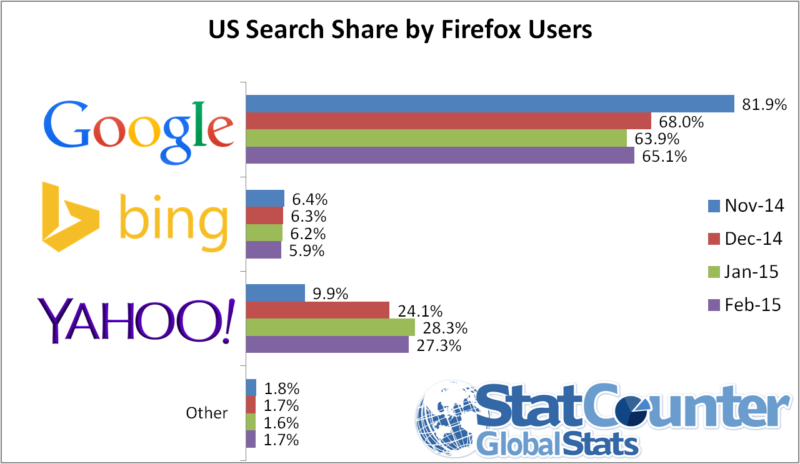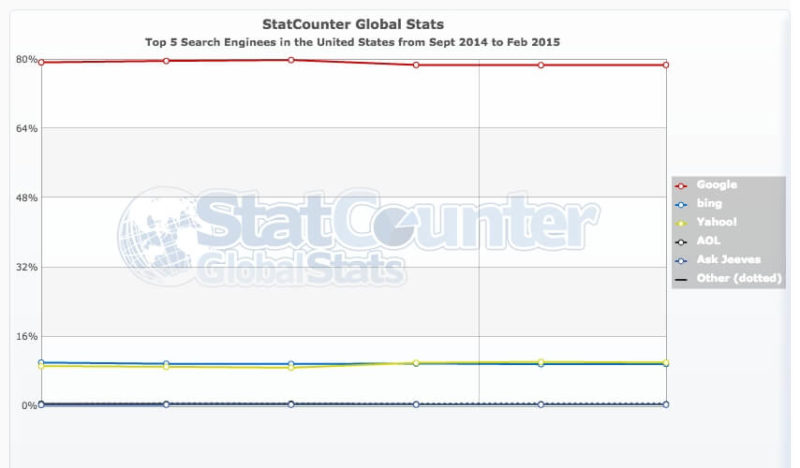Yahoo’s Search Share Drops For First Time Since Firefox Deal Began
Yahoo couldn't maintain gains from previous months and small "switchback" losses to Google likely to erode share more in the coming months.

Yahoo’s share of search in the United States has dropped for the first time since it signed a deal to be the default search engine in Firefox. The drop follows two months of impressive gains. The loss suggests that a “high water mark” has been reached for gains the deal can produce for Yahoo and that “switchback” by Google users may now slowly cause Yahoo to give back share.
A Small Drop For Yahoo
In the middle of last November, Yahoo because the default search provider for Firefox users in the United States. While that includes mobile distribution, Firefox has virtually no mobile users. So, it is desktop search statistics that really show the health of that deal. The latest stats from StatCounter show Yahoo having a slight decrease from last month:
The drop from January 2015 to February 2015 is small, only 0.3%. However, it comes after two months of significant gains: 2.1% in December and 0.7% in January.
Google Remains By Far Largest On Desktop
Here is the desktop search share in the United States for February 2015, for the three largest search engines of Google, Bing and Yahoo, according to StatCounter. Next to the percentage is the gain or decrease compared to the previous month:
- Google: 74.9% (+0.3%)
- Bing: 12.6% (no change)
- Yahoo: 10.4% (-0.3%)
A “Switchback” Rate Emerges?
Google also appears to have gained all of Yahoo’s losses. The difference — 0.3% — is potentially a “switchback” rate for the coming months, a rate that until now has been masked by Yahoo’s gains.
To understand this more, see our story from last week: Is Yahoo’s Rise In Search Market Share About To End? It explains how Yahoo seems to have had a first rise due to gaining existing Firefox users followed by a second rise as Firefox itself grew. But by February, all those new users who could be easily gained by both Yahoo and Firefox appear to have been. With no more gains, the loss of those switching back to Google appears to have emerged.
Also, after I wrote this story, StatCounter itself issued a press release about the drop. As part of that, it specifically looked at search activity within Firefox, to better understand how much Yahoo’s decline really was due to changes there. It found that the Google share of search within Firefox has risen to 65.1% in February, an increase of 1.2%. Yahoo dropped to 27.3%, a decrease of 1%. Here’s the comparison chart for within Firefox over the past four months, that it released:
Factor In Mobile & Google Is Even Larger
For combined traffic (desktop, mobile, tablet and console) here’s the trend over the past six months, according to StatCounter:
A combined traffic view is better than a desktop-only view, when talking search market share, because about half of Google’s search traffic comes from mobile users, based on past statements by Google. Desktop-only doesn’t capture the full picture. Here’s the combined share for the top three search engines, for February 2015, with change from the previous month:
- Google: 78.7% (+0.1%)
- Yahoo: 10.1% (-0.1%)
- Bing: 9.8% (+0.1%)
Again, for more details on why Yahoo’s double-dip growth likely couldn’t make it for a third month and seems unlikely to change short of any deal with Apple, see our previous post:
Contributing authors are invited to create content for Search Engine Land and are chosen for their expertise and contribution to the search community. Our contributors work under the oversight of the editorial staff and contributions are checked for quality and relevance to our readers. The opinions they express are their own.
Related stories


